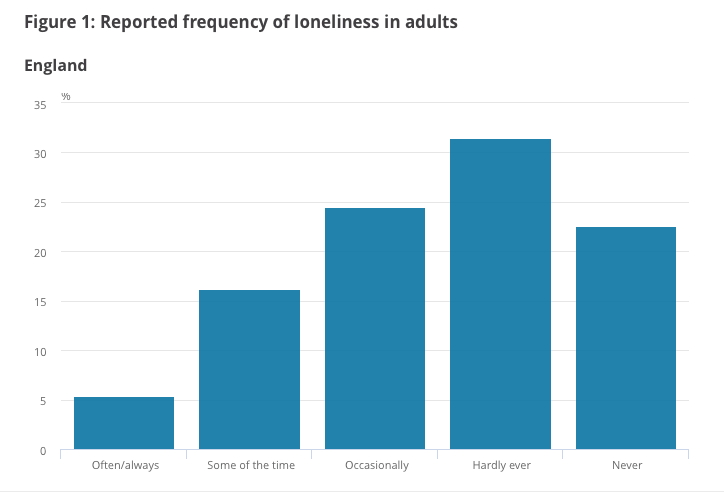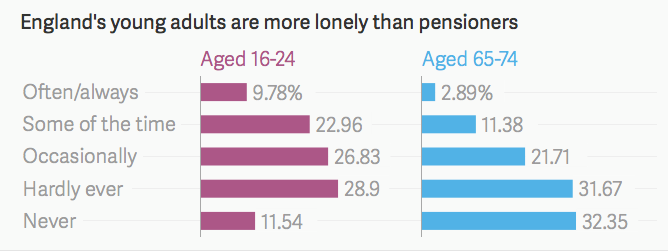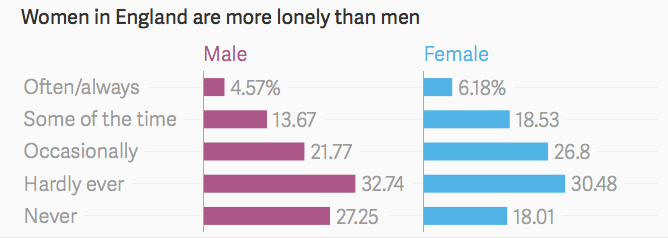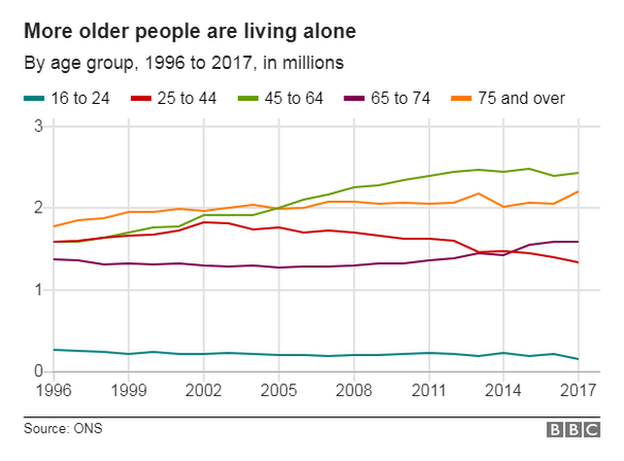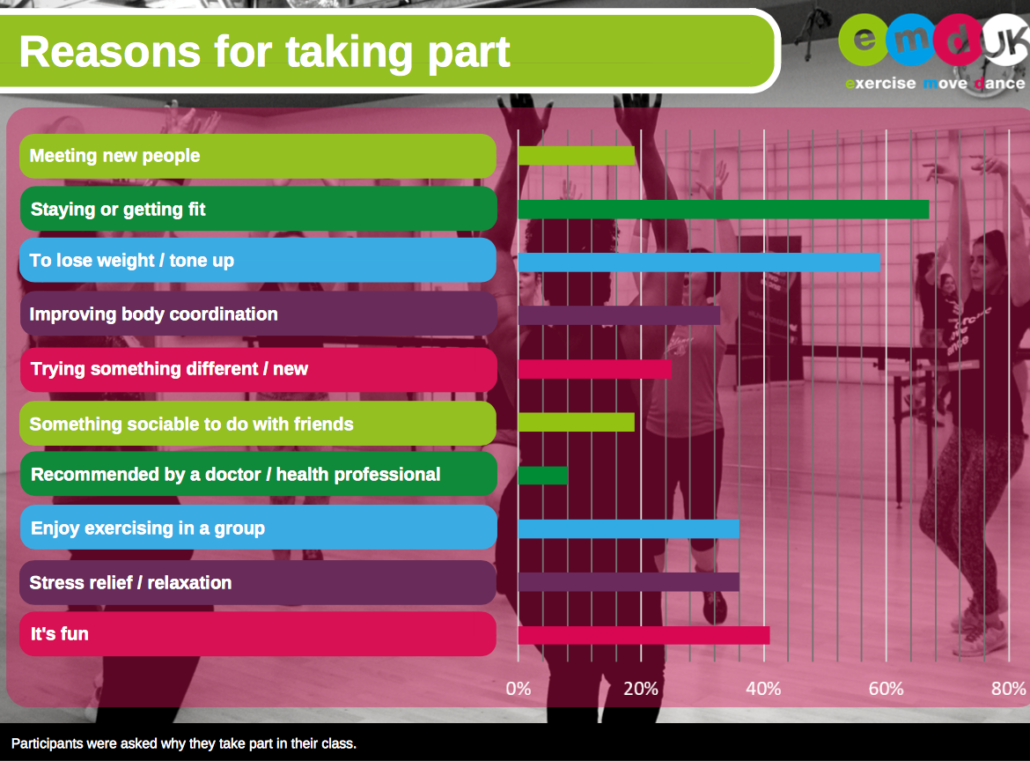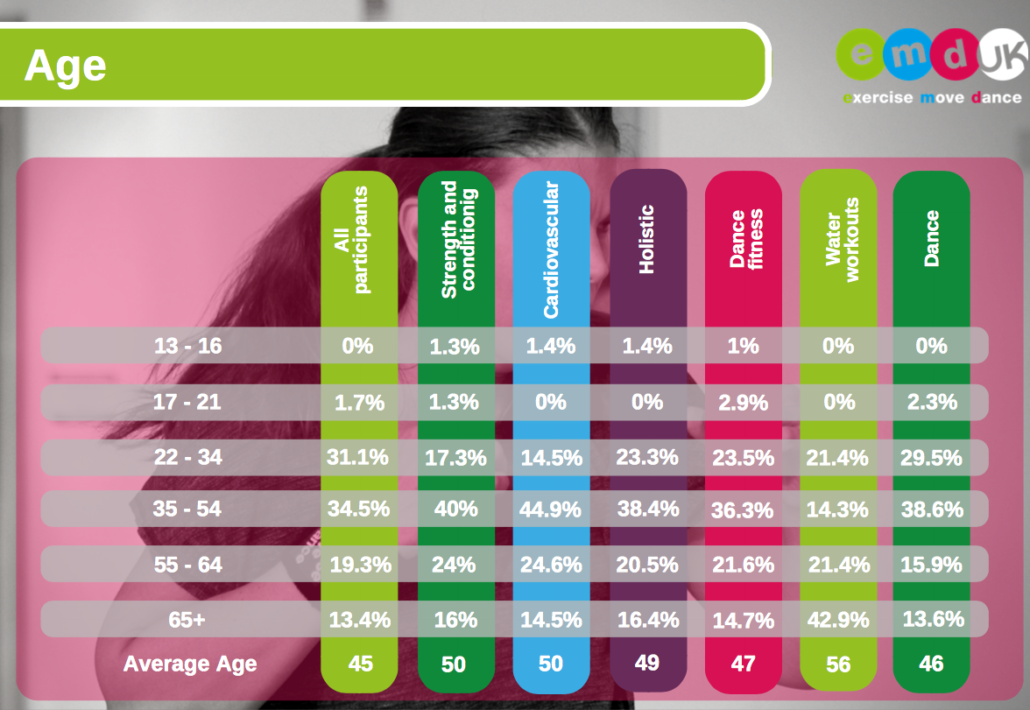Last Updated on August 9, 2018 by
One of the very best things about joining a group exercise class is the social aspect. Group exercise isn’t just about getting fit and healthy – though you’ll certainly do that – but also about meeting people, having fun together, dancing, smiling, and laughing all the way.
There’s been a lot of press coverage recently about how the UK is in the throes of a loneliness epidemic – and it’s not just the elderly who are prone to feelings of isolation or being alone.
Figures published in April from the Office for National Statistics revealed that more than 5% of adults in England felt lonely “often” or “always” between 2016 and 2017 (that’s one in every 20 adults), with 16% enduring feelings of loneliness sometimes, and 24% occasionally.
(Image source: ons.gov.uk)
Perhaps surprisingly, younger adults (those aged between 16 and 24) were found to experience loneliness more often than those in older age groups. Women, widows, single people, renters and those with poor health were also identified as more susceptible.
(Image source: qz.com)
None of this is to say that neither men nor the elderly are vulnerable to loneliness, characterised by the NHS as the feeling of being alone or isolated. In fact, the data also revealed that 2.2 million people over 75 now find themselves living alone – nearly half a million more than in 1996.
Lone parents also find themselves on their own after their children have left home, as do the newly single following a relationship breakdown – something that affects middle-aged men in particular. Nearly 2.5 million people aged between 46 and 64 now live alone in the UK – almost a million more than two decades ago, and representing the fastest growing age group.
(Image source: bbc.co.uk)
Loneliness Can Be Life-threatening
Loneliness can be severely life-altering – and even life-threatening – for those who experience it. Linked with psychological problems such as alcohol and drug abuse, eating disorders and depression, loneliness can be quite literally devastating.
There is also much evidence to suggest that loneliness causes biological problems as well as psychological ones, and can even lead to death. According to figures published in the Independent, analysis of 300,000 people in 148 studies found that loneliness is associated with a 50% in mortality from any cause. In other words, no matter the ailment a person may be suffering with, loneliness makes it worse, and renders the condition harder to recover from.
In these terms, the analysis concluded, loneliness may be considered comparable to smoking 15 cigarettes a day, and more dangerous than obesity.
Combatting the Ill Effects of Loneliness with Group Exercise
Group exercise classes are more than just loud music, fast movements, and shouts of encouragement from an instructor at the front of a class. They also offer fantastic social inclusion opportunities, health benefits, and psychological support – all of which are imperative for combatting the feelings and consequences of loneliness.
The group setting really helps people develop a sense of community. Participants truly feel like they are a part of something by being surrounded by like-minded, encouraging people, many of whom have will have similar ambitions and reasons for joining as their own.
In our most recent Participant Survey, EMD UK found that while getting fit and losing weight were the top reasons most people gave for taking part in group exercise, social aspects also ranked very highly. More than 40% of respondents said they enjoyed group exercise because it was fun, while a third said that they sought stress relief or relaxation from taking part, and nearly 20% said they enjoyed meeting new people.
(Image source: emduk.org)
What’s more, our survey found that group exercise is something enjoyed by all age groups in roughly equal measures. Around one third of respondents were between the ages of 17 and 34, another third between 35 and 54 with the remaining third 55 and over.
(Image source: emduk.org)
People of all ages attend group exercise classes as a means to get out from between the same four walls, break up their usual routines, and meet and have fun with people in their community. Keeping fit is of course vital for good health, but many people find it hard to find the motivation – especially when alone. The great thing about group exercise, though, is that you’re never alone – you’ll be in a class full of people all dancing and bopping and grooving to some fun and funky music. And that’s great for the body, mind, and soul.
Group exercise classes are a truly wonderful place to meet people, make friends, and have adult conversations about all sorts of things – not just fitness routines – before and after class. Many group exercise participants organise get-togethers with their fellow class members outside of the class setting as well – extending the opportunity to socialise and improve your sense of happiness and well-being.
What’s more, bonding with a group helps people get motivated and meet their fitness goals. Social influence really does play a key role in motivating participants. Exercising with peers can enhance workouts and turn them into something truly fun – yet still challenging and rewarding – and make going to the gym not a chore, but something that brings you real joy.
In short, by joining a group exercise class you’ll laugh, you’ll sweat, you’ll make friends, you’ll work hard, you’ll improve your fitness, and you’ll start feeling energised, refreshed, ready to take on the world, and look forward to coming back each and every week – and that’s something very special indeed.
If you’re feeling lonely, or are concerned about someone else, and want to find out more about the fantastic group exercise opportunities in your area, then get in touch with EMD UK today. We can help find a class near you, and provide the support you need to motivate yourself and others out of loneliness and into the inclusive world of group exercise.


